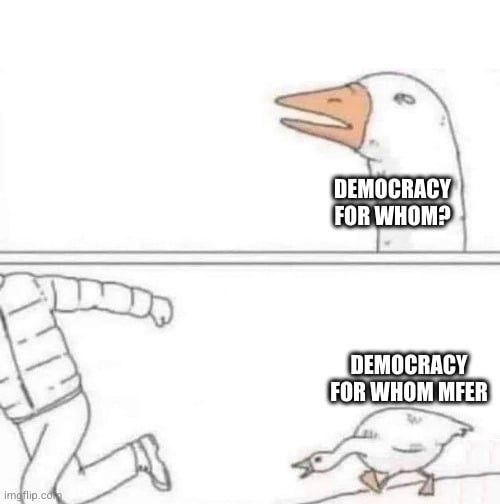- cross-posted to:
- leftism@lemmy.world
au·thor·i·tar·i·an·ism /əˌTHôrəˈterēəˌnizəm/ noun: the enforcement or advocacy of strict obedience to authority at the expense of personal freedom. “he warned against the intrusion of authoritarianism in various countries” lack of concern for the wishes or opinions of others. “in his authoritarianism he has displayed disrespect for the culture he works in”
Literally no part of the definition of authoritarianism matches your assertion. Admittedly “lack of concern for the wishes or opinions of others” frequently manifests as separate sets of rights, but it isn’t by any means necessary.
That is the definition of individual authoritarianism not institutional authoritarianism. Basically just the first half of the definition. Whereas the aspect I focus on is exactly what you were getting to at the end there. That general definition is from The Authoritarian Personality and is not accepted as definitive in any academic studies of authoritarianism in governance. So I suppose what I am doing here is operating off of an academic definition that is not nearly as commonly used as I was assuming. Tho -side note- it is quite interesting to think about how this public?definition has been used to make the argument that the entire moral and psychological basis of conservatism as a whole, is individual authoritarianism.
I think the word you are looking for is apartheid state? And I think a lot of people would agree the US was for basically most of its history.
The etymology/definition of “authoritarian”, clears up why this is a fallacy. Authoritarian has to do with government having ultimate and totally authority over all people (think draconian laws curtailing movement, freedom of speech). Some on the party may enjoin freedoms beyond the peasants, or an outside group like you are suggesting.
Fascism is often flavors of authoritarian and it also uses out groups to consolidate power.
I think your logic misses the mark, and many other readers might agree apartheid and/or fascism might better describe these portions of US history.
thats completely fair. its future historians who get to have settled terms and that only comes from us in the present doing our best to hash it out. By my assessments, the etymology and definition of authoritarian does support the idea that the US heavily involves autocratic elements in its governance, and can be described as authoritarian. I specifically avoid calling the US fascist because that’s an argument that mostly makes sense to people outside the US, and my core audience is within the imperial core. At the end of the day, I did just need to pick a term that seemed to fit best and be effective at communicating my argument, and authoritarianism is what ive settled on for the foreseeable future. Though, i would say there’s a lot of overlap in our thoughts on the subject. The core argument this meme is trying to reference is the idea that because segregation and chattel slavery were race based apartheid style systems, and that is a subsection of authoritarianism, then for most of US history the republic has operated as part of an authoritarian system. ==> so why does saying it out loud massively violate american taboos about its own history and relationship as a state to white supremacy? chiefly, that it was founded on it, and operated on it. until like … within living memory. thats the official version of events. bizarre. but its not bizarre. its exactly how language and societies react when states do this.

The US is NOT authoritarian. If it was, it would actually function. The US since the founding has been a theocratic oligarchy. The “representive government” only represents the top 1%-2% of the population, and only does so about 30%-40% of the time. The 99% else get close to 0% representation.
The US has so many laws and rights, that what you see on paper means nothing. It’s all about practice. On paper you have the right for freedom of religion. Or speech. Or press. In reality you do not. If you aren’t the proper religion, things don’t work for you and you can easily be arrested just because. Just look at the student protests being beaten and shot at by police now for speech and protest rights that don’t exist. Press is governmentally censored in many ways, and certain topics are illegal and others get you and your whole organization raided.
It’s a failed state. This stupid expression of the country being an “experiment” of governance is ridiculous. Religious elite ruling classes has been the norm for most of human civilization. Even in the Roman Empire, there was a court. With the English Monarchy pre Magna Carta, there was a court. The monarch with absolute power did not act like an idiot, they had council from representives across their kingdoms, the elites with the power and money and titles to meet with the ruler.
The US is a Republic
Russia, Iran and North Korea are republics too. Republic just means “not a monarchy”. The US is a (deeply flawed) representative democracy.


